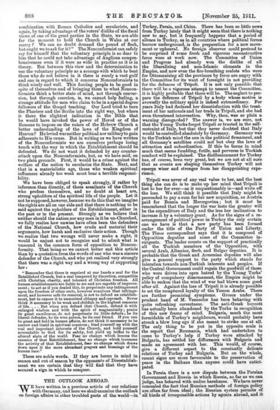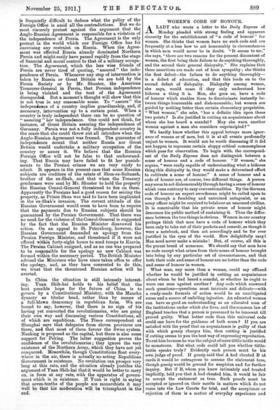THE OUTLOOK ABROAD.
WE have written in a previous article of our relations with Germany, and here we shall examine the outlook on foreign affairs in other troubled parts of the world—in Turkey, Persia, and China. There has been so little news from Turkey lately that it might seem that there is nothing new to say, but it frequently happens that a period of silence in Turkey, as in all countries where political forces burrow underground, is the preparation for a new move- ment or upheaval. No foreign observer could pretend to be surprised if some fresh and vigorous reconstructive force were at work now. The Committee of Union and Progress had already won the dislike of all the liberalizing and non-Islamic elements in the Empire, and now even the fire-breathing zealots who were for Ottomanizing all the provinces by force are angry with the Committee for its want of foresight in not providing for the defences of Tripoli. It is not only possible that there will be a vigorous attempt to unseat the Committee, it is highly probable that there will be. The neglect to pre- pare the defences of Tripoli by a body whose motive is avowedly the military spirit is indeed extraordinary. For years Italy had declared her dissatisfaction with the treat- ment of her nationals and her trade in Tripoli, and she had even threatened intervention. Why, then, was so plain a warning disregarded? The answer is, we are sure, not that the Young Turks forgot Tripoli or trusted in the self- restraint of Italy, but that they never doubted that Italy would be controlled absolutely by Germany. Germany was to the Turkish mind the sun in the political firmament, and all Germany's satellites could not but obey the laws of attraction and subordination. If this be borne in mind much that seems fumbling, futile, and perverse in Turkish conduct will be explained. The disillusionment for Turkey has, of course, been very great, but we are not at all sure that as events are shaping themselves Turkey will not emerge wiser and stronger from her disappointing expe- rience.
Tripoli was never of any real value to her, and the best thing she can do is to make up her mind that Tripoli is lost to her for ever—as it unquestionably is—and write off the loss. We still think it possible that Italy might be persuaded to pay a sum for her new acquisition, as Austria paid for Bosnia and Herzegovina ; but it must be remembered that the longer the war lasts the greater will be the expenditure of Italy and the less her inclination to increase it by a voluntary grant. As for the signs of a re- arrangement of political power in Turkey the only certain one we have is that a new party has been formed under the title of the Party of Union and Liberty. The Times correspondent says that it is composed of Opposition deputies and some of the Committee in- surgents. The leader counts on the support of practically all the Turkish members of the Opposition, with several Arab, Albanian, Serb, and Bulgar deputies. It is probable that the Greek and Armenian deputies will also give a general support to the party which stands for toleration towards non-Turkish interests and peoples. If the Central Government could regain the goodwill of those who were driven into open hatred by the Young Turks' policy of compulsory disarmament, the Empire might be able to reckon that the wind of war had blown some good after all. Against the loss of Tripoli it is already possible to set the recaptured loyalty of the Yemen Arabs. There are further promising symptoms. Greece under the prudent hand of M. Venezelos has been behaving with quite refreshing correctness. The anti-Greek boycott has actually been abandoned by the Turks in recognition of this new frame of mind. Bulgaria, much the most formidable of Turkey's neighbours, would probably have struck a blow long ago if she meant to strike one at all. The only thing to be put in the opposite scale is the report that Roumania, which had undertaken to come to Turkey's help if Turkey were attacked by Bulgaria, has settled her differences with Bulgaria and made an agreement with her. This would, of course, give a different aspect to the constantly delicate relations of Turkey and Bulgaria. But on the whole, recent signs are more favourable to the preservation of peace in the Balkans than anyone could have antici- pated.
In Persia there is a new dispute between the Persian Government and Russia in which Russia, so far as we can judge, has behaved with undue harshness. We have never concealed the fact that Russian methods of foreign policy are often far from ideal ; the Russian system permits of all kinds of irresponsible actions by agents abroad, and it is frequently difficult to deduce what the policy of the Foreign Office is amid all the contradictions. But we do most sincerely protest against the argument that the Anglo-Russian Agreement is responsible for a violation of the independence of Persia. The Agreement is the only pretext in the world which our Foreign Office has for exercising any restraint on Russia. When the Agree- ment was effected Russia already dominated Northern Persia and might easily have passed rapidly from the stage of financial and moral control to that of a military occupa- tion. The Agreement, which the less wise friends of Persia are never tired of quoting, " assured." the inde- pendence of Persia. Whenever any step of intervention is taken by Russia or Great Britain we are told by the Persia Society or by Mr. Shuster, the American Treasurer-General in Persia, that Persian independence is being violated and the text of the Agreement disregarded. But a moment's thought will show that this is not true in any reasonable sense. To " assure " the independence of a country implies guardianship, and, if necessary, intervention up to a certain point. When a country is truly independent there can be no question of " assuring " her independence. One could not think, for instance, of Great Britain assuring the independence of Germany. Persia was not a fully independent country in the sense that she could throw out all intruders when the Anglo-Russian Agreement was framed. The guarantee of independence meant that neither Russia nor Great Britain would undertake a military occupation of the country or annex it. We believe that the Russian Foreign Office will not be false to that understand- ing. That Russia may have failed to fit her punish- ments to the Persian crimes we are very ready to admit. It appears in the present case that some Russian subjects are creditors of the estate of Shua-es-Sultaneh, brother of the ex-Shah, and that when the Treasury gendarmes were sent by Mr. Shuster to hold the property the Russian Consul-General threatened to fire on them. Apparently the Persians had a good reason for seizing the property, as Prince Shua was said to have been implicated in the ex-Shah's invasion. The correct attitude of the Russian Government would seem to have been to require that the payments due to Russian subjects should be guaranteed by the Persian Government. That there was no need for the violence of the Consul-General is suggested by the fact that the Russian Minister disavowed his action. On an appeal to St. Petersburg, however, the Russian Government demanded an apology from the Persian Foreign Minister, and threatened if it were not offered within forty-eight hours to send troops to Kazvin. The Persian Cabinet resigned, and as no one was prepared to be responsible for the apology no new Cabinet was formed within the necessary period. The British Minister advised the Ministers who have since taken office to offer the apology, and, as they have consented to do this, we trust that the threatened Russian action will be averted.
In China the situation is still intensely interest- ing. Yuan Shih-kai holds to his belief that the best possible hope for the future of China is to govern by a Constitutional Ministry, with the Manchu dynasty as titular head, rather than by means of a full-blown democracy in republican form. We are bound to say, however, that there is no sign of his having yet converted the revolutionaries, who are going their own way and discussing various Constitutions, all of which are republican. The Times correspondent at Shanghai says that delegates from eleven provinces are there, and that most of them favour the Swiss system. Nanking is proposed as the capital, but there is also some support for Peking. The latter suggestion proves the confidence of the revolutionaries ; they ignore the very existence of the Northern Army, which they have not yet conquered. Meanwhile, though Constitutions float every- where in the air, there is actually no acting Republican Government in existence. No revolution can prosper very long at this rate, and the situation already justifies the argument of Yuan Shih-kai that it would be better to carry on, in form at any rate, with the apparatus of govern- ment which is in existence. If Yuan is right in saying that seven-tenths of the people are monarchists it may well be that his moderation will be triumphant in the end.



















































 Previous page
Previous page